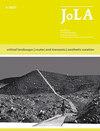树木的木材:柏林和墨尔本城市森林的设计和政策制定
IF 0.3
4区 艺术学
0 ARCHITECTURE
引用次数: 0
摘要
摘要本文考虑了墨尔本100多年来最大的开放空间贡献——Birrarung marr的第四自然城市林业策略的潜力,作为一种适应过热和干旱的投机性种植和维护策略。本文的结构分为三个部分。第一部分简要讨论了自发种植实践的理论和适应性,例如Kowarik的第四自然哲学,以及它对自然公园Schöneberger Südgelände(柏林)的设计和维护的影响。第二部分介绍了Birrarung Marr的设计景观,并概述了自2002年以来其不断发展的种植策略和城市森林。它分析了气候变化、市政政策和最近的种植设计(如伍迪草甸的插入)如何影响并继续影响公园森林的变化。最后,第三部分利用Schöneberger Südgelände作为参考,推测Birrarung Marr未来的种植设计方法和气候适应策略,因为墨尔本市正在寻求新的设计应对预测的城市供暖。关键词:景观建筑、城市森林、第四自然、全球变暖、种植设计注1瓦尔德海姆解释说,在这几十年里,设计师和理论家“阐明了生态系统被视为自组织和开放式的潜力,同时为城市干预提供了一个战略框架”。查尔斯·瓦尔德海姆,景观作为城市主义:一般理论(普林斯顿:普林斯顿大学出版社,2016),32.2这些主题在新千年中继续被探索。参见:Peter Del Tredici,“自发的城市植被:全球化世界变化的反映”,《自然与文化》5(2010),第399 - 315.3。关于克莱姆萨蒙的理论及其对他的种植设计方法的影响的概述,参见:alessandro Rocca,行星花园:吉尔斯·克莱姆萨蒙的景观建筑(巴塞尔:Birkhäuser, 2008)Derborence岛的植物位于7米高的高原上,这使得废弃的植物设计能够进化(并适应)更广泛的景观系统Ingo Kowarik,“城市与荒野:一个新的视角”,《国际荒野杂志》第19期(2013),32-36.6页。正如Kowarik解释的那样,“几乎每个人都很清楚”,第四自然“在新的规划和建筑方案中被考虑”,“景观设计师被训练将这种类型的自然包括在他们的设计中”。2014年10月6日,Ingo Kowarik采访Brent Greene。第四自然设计方法的例子在Park am Gleisdreieck, Park am Nordbahnhof和NaturPark Schöneberger Südgelände.7都很明显2014年10月6日,Ingo Kowarik采访Brent Greene。Kowarik的理论得到了20世纪70年代生态学研究的支持,该研究研究了柏林荒地上自发植物的适应潜力。参见:Herbert Sukopp, Hans-Peter Blume和Wolfram Kunick,“柏林荒地的土壤,植物群和植被”,见:Ian C. Laurie(编),城市中的自然:城市绿地设计和开发中的自然环境(奇切斯特和纽约:Wiley, 1979), 115-131: 121.8埃德娜·沃林,澳大利亚路边(牛津:牛津大学出版社,1952)10 .贝蒂·马洛尼和吉恩·沃克,《设计澳大利亚丛林花园》(悉尼:霍维茨出版社,1966)参见:Catherine Jane Bull,《与旧景观的新对话:当代澳大利亚的景观建筑》(Victoria Mulgrave: Images Publishing Group, 2002);布鲁斯·麦肯齐,《景观设计:澳大利亚》(悉尼:布鲁斯·麦肯齐设计,2011);凯特·赫德和杰拉·伊万科维奇-沃特斯,《本土:澳大利亚植物的艺术与设计》(墨尔本港,维多利亚:澳大利亚泰晤士和哈德逊,2017年);朱利安·拉克斯沃西,《杂草丛生:景观建筑与园艺之间的实践》(剑桥,马萨诸塞州:麻省理工学院出版社,2018)。尽管缺乏理论基础,但这些文献仍然在澳大利亚本土和本土植物的范围内,松散地参考了自发种植方法Timothy J. Entwisle, Chris Cole和Peter Symes,“适应墨尔本花园(维多利亚皇家植物园)的植物景观以应对气候变化”,植物多样性39/6(2017),338-347:339.12。大自然保护协会和弹性墨尔本,生活墨尔本:我们的都市城市森林(2019),livingmelbourne.org.au/wp-content/uploads/2022/10/Strategy_online。pdf。最近通过设计解决气候缓解和热适应性问题的本地种植试验仅限于实验展示,尚未影响景观建筑实践。参见:Hui-Anne Tan等人,“设计和管理生物多样性街景:来自墨尔本市的关键经验”,城市生态系统25/3(2022),733-740.13。 14参见:Jens Lachmund,《绿化柏林:科学、政治和城市自然的共同生产》(剑桥,马萨诸塞州:麻省理工学院出版社,2013年),详细概述了柏林新生态观念的发展。15 Linda N. Groat和David Wang,《建筑研究方法》(霍博肯,新泽西州:John Wiley and Sons出版社,2013年)Joseph Pearson,柏林(伦敦:Reaktion Books, 2017), 89.17 Jouni Häkli,“城市中自然的文化和政治:柏林“绿楔”的案例”,资本主义,自然,社会主义7/2 (1996),125-138:137.18 Ingo Kowarik和Andreas Langer,“自然公园Südgelände:在柏林一个废弃的铁路场连接保护和娱乐”,in: Ingo Kowarik和Stefan Körnern(编辑),野生城市林地:城市林业的新视角(柏林,Springer-Verlag, 2005), 287-299:288-290.19 Lachmund,绿化柏林,同上(注14),172.20 Kowarik和Langer,“自然公园Südgelände”,同上(注18),291.21 Ingo Kowarik采访Brent Greene, 2014年10月6日。Kowarik和Langer,“自然公园Südgelände”,同上(注18),291.23 Lucia Grosse-Bächle,“介入和离开空间之间的策略”,in: Kowarik和Körnern,野生城市林地,同上(注18),231-246;243.24 Daniel Fenner等人,“德国柏林和波茨坦的热浪——1893年至2017年热浪定义的长期趋势和比较”,《国际气候学杂志》39/4 (2019),2422-2437:2434.25 Robert Vautard等人,“人类对西欧2019年6月和7月热浪破纪录的贡献”,《环境研究快报》15/9(2020),1.26与gr<s:1>柏林个人通信,2023年1月24日。gr<s:1> n Berlin是一家柏林国有景观开发和管理公司。grn柏林不灌溉自然或景观保护区Schöneberger Südgelände也储存碳并调节气候。参见:Kees Lokman,“空置作为实验室:在空置的城市土地上重新构想社会生态系统的设计标准”,景观研究42/7 (2017),728-746:743.28Kim Dovey, Rob Adams和Ron Jones, Urban Choreography: Central Melbourne, 1985 (Carlton, Victoria: Melbourne University Press, 2018), 124.30同上,125.31同上,32同上,163.33 Ronal Jones对Brent Greene的采访,2016年1月29日。然而,维多利亚州政府的经济和规划议程导致拟议的森林被放弃,取而代之的是草坪梯田和TCL的种植设计。参见:布伦特·格林和菲奥娜·约翰逊,《墨尔本和惠灵顿千禧城市公园设计》;“transstasman泡沫中的不同殖民基础如何影响景观实践”,第37届澳大利亚和新西兰建筑历史学会会议论文集(SAHANZ 2020), 330-341, sahanz.net/conferences/what-if-what-next-speculations-on-historys-futures/.35 Perry Lethlean,“当你构成时,很难变得凌乱- tcl编织路径,一种由差异维持的实践”(博士论文,RMIT大学,2013),150.36同上。175.37 TCL的设计在园区开放后不久就失败了。Rayner和Williams写道,这种失败是由糟糕的植物选择、放弃维护和不断变化的气候压力造成的,而这些本来可以通过“更好的跨学科专业关系”来避免。另外,Lethlean认为“短期营销策略而不是长期管理现实”是影响TCL取消种植设计的主要因素。更多详细信息,请参见:John Rayner和C. C. Williams,“从失败中学习:评估城市景观中的植物性能”,园艺学报1108 (2016),220-226:225;墨尔本城市,城市森林战略:打造一个更绿色的伟大城市2012 - 2032 (2012),Melbourne .gov.au/ sitecolltiondocuments / Urban - Forest - Strategy .pdf.39同上.40同上.41墨尔本市,气候变化适应战略更新(2017),Melbourne .vic.gov.au/sitecollectiondocuments/ Climate - Change - Adaptation - Strategy - Refresh -2017.pdf.42所有的战略都包括发展新的种植和管理策略来对抗全球变暖墨尔本市,城市森林战略,同稿(注释38),7.44 David Callow(墨尔本市公园和城市绿化主管)将野花草地描述为一个“突破性项目”,后来影响了伍迪草地。45墨尔墨尔市,伍迪草甸试点项目:创造多样化开花景观的指南(2020),Melbourne .vic.gov.au/SiteCollectionDocuments/ Woody - Meadow - Pilot - Project .pdf.46Megan Backhouse,“墨尔本拥有自己的“野生”草地”,悉尼先驱晨报,2016年9月11日,smh.com。 非盟/娱乐/墨尔本-被-的-的-野生草地grcmto.html.47——20160909墨尔本市,伍迪草地试点项目,同上(注45),6.48同上,5.49同上,8.50克莱尔·马丁,“杂乱的研究:《规划生命周期城市》,澳大利亚景观,2017年9月13日,landscapeaustralia.com/articles/rambunctious-research/.51 Paul Thompson(景观设计师)、Rodger Elliot(本地规划专家)、Digby Growns(植物育种家)、John Arnott(园艺学家)和Warren Worboys(园艺学家)协助研究团队为Woody Meadow项目选择植物。请注意,保罗·汤普森被认为是植物专家中唯一的设计专家Anita Bakshi和Frank J. Gallagher,“与第四自然的设计”,景观设计杂志15/2(2020),24-35.53同上,34.54 Brent Greene,“设计墨尔本的E-Gate棕地:一个新的城市更新战略前景的生态性能和毒性”,AD19会议论文集:设计研究(2020),201-218.55 VicTrack铁路开发界面指南(2019),VicTrack。com.au / - /媒体/ victrack /文件/资源/ victrack-raildevelopment-interface-guidelines.pdf.56Ma-gorzata Wrzesie- and Bo-ena Denisow,“铁路周边地区入侵植物分布的影响因素:以波兰东南部为例”,Biológia 72/11 (2017), 1275-1284;兰迪·默滕斯,“杂草和铁路:植物科学家让过境点远离危险植被”,CAFNR新闻,2014年10月6日,密苏里州。墨尔本城市,气候变化对墨尔本的影响(n.d), Melbourne .vic.gov.au/about-council/vision-goals/ eco-city/Pages/adapt -to- Climate - Change .58Birrarung Marr位于半潮汐的雅拉河岸边,在一个干涸的短暂湿地的顶部墨尔本水务局,2017年2月海平面上升规划指南:菲利普港和西港地区(2017),melbournewater.com.au/sites/default/files/ planningfor - Sea - Level .pdf.60 Manel Bellache等人,“两种入侵杂草Erigeron属(Asteraceae)对盐胁迫和水分缺乏的耐受性比较分析”,植物(巴塞尔)11/15 (2022),2059;g<s:1> l<e:1> zar Duygu Semiz,“盐度对茴香产量、水分利用、矿物和精油含量的影响”,Tarım Bilimleri Dergisi 18 (2012), 177-186;Panagiota Filippou et al.,“脯氨酸和活性氧/氮代谢参与入侵植物Ailanthus altissima对干旱和盐的耐受反应”,环境与实验植物学97 (2014),1-10;Arifa Khalid和Faheem Aftab,“盐胁迫下外源施用24-表油菜素内酯对体外培养的龙葵生长、蛋白质含量和抗氧化酶活性的影响”,《体外细胞与发育生物学》(2016),81-91;刘木新,廖慧萱,彭少林,“耐盐本土植物对其他环境的响应比耐盐入侵植物更强”,《生态与进化》,2019年第9/13期;维州农业部,盐碱指示植物:土壤盐渍化识别指南(2020),vro. Agriculture .vic.gov.au/dpi/ vro/vrosite.nsf/pages/water_spotting_soil_salting.61Matthew Gandy,“设计的熵:Gilles classment, Parc Henri Matisse和前卫城市主义的极限”,《国际城市与区域研究杂志》37/1(2013),259-278.62。许多学者都将设计研究/设计推测作为创造知识的当代模式。参见:Julie Ellison和Timothy K. Eatman,《公共奖学金:知识创造和终身教职政策》(Syracuse, NY: imagine America, 2008);David Salomon,“实验文化:论设计论文的“终结”与研究工作室的兴起”,《建筑教育杂志》(2011),第65/1期,34-44;彼得·唐顿,《设计研究》(墨尔本:RMIT出版社,2003).63虽然木本草甸经受住了炎热和干旱的压力,但对本地植物的利用限制了自发的创新,这些创新也具有适应性和弹性。作者简介brent Greene是皇家墨尔本理工学院(RMIT)景观建筑专业的讲师。Brent的教学和研究侧重于通过自然植物、酷儿生态、边缘景观和后工业城市更新进行城市生态设计。他利用设计研究方法来调查文化价值对城市生态设计方法的影响,并扩大对大都市中自发城市植物的认识。Wendy Walls是澳大利亚墨尔本大学景观建筑设计专业的讲师。 Wendy的研究和教学侧重于使用数据和数字技术来设计外部开放空间的动态气候现象,创新的设计方法和跨学科的实践。她的博士研究了澳大利亚城市的热感觉问题,目前的气候变化预测表明,澳大利亚城市的热浪更频繁、更强烈、更危险。本文章由计算机程序翻译,如有差异,请以英文原文为准。
Wood for the trees: Design and policymaking of urban forests in Berlin and Melbourne
Abstract This article considers the potential of Fourth Nature urban forestry tactics at Birrarung Marr—the City of Melbourne’s largest open space contribution in over 100 years—as a speculative planting and maintenance strategy for adapting to excessive heat and drought. This paper is structured in three parts. The first section briefly discusses the theoretical and adaptation qualities of spontaneous planting practices, such as Kowarik’s Fourth Nature philosophy, and its impact on the design and maintenance of Natur-Park Schöneberger Südgelände (Berlin). The second part introduces the designed landscape of Birrarung Marr and provides an overview of its evolving planting strategies and urban forest since 2002. It analyses how climate change, municipal policy and recent planting designs such as the Woody Meadow insertion have impacted—and continue to impact—changes to the park’s forest. Lastly, part three utilizes Schöneberger Südgelände as a reference to speculate on future planting design approaches and climate adaptation tactics for Birrarung Marr as the City of Melbourne seeks new design responses to predicted urban heating.
求助全文
通过发布文献求助,成功后即可免费获取论文全文。
去求助
来源期刊

Journal of Landscape Architecture
ARCHITECTURE-
CiteScore
0.60
自引率
16.70%
发文量
10
期刊介绍:
JoLA is the academic Journal of the European Council of Landscape Architecture Schools (ECLAS), established in 2006. It is published three times a year. JoLA aims to support, stimulate, and extend scholarly debate in Landscape Architecture and related fields. It also gives space to the reflective practitioner and to design research. The journal welcomes articles addressing any aspect of Landscape Architecture, to cultivate the diverse identity of the discipline. JoLA is internationally oriented and seeks to both draw in and contribute to global perspectives through its four key sections: the ‘Articles’ section features both academic scholarship and research related to professional practice; the ‘Under the Sky’ section fosters research based on critical analysis and interpretation of built projects; the ‘Thinking Eye’ section presents research based on thoughtful experimentation in visual methodologies and media; the ‘Review’ section presents critical reflection on recent literature, conferences and/or exhibitions relevant to Landscape Architecture.
 求助内容:
求助内容: 应助结果提醒方式:
应助结果提醒方式:


